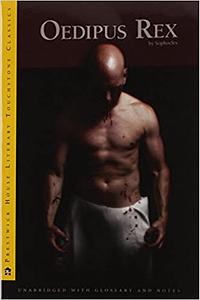You need to sign in or sign up before continuing.
Take a photo of a barcode or cover
challenging
fast-paced
Plot or Character Driven:
Character
Strong character development:
Complicated
Loveable characters:
Complicated
Diverse cast of characters:
No
Flaws of characters a main focus:
Complicated
challenging
dark
mysterious
sad
tense
medium-paced
Plot or Character Driven:
A mix
Strong character development:
Yes
Loveable characters:
Yes
Diverse cast of characters:
Yes
Flaws of characters a main focus:
Complicated
challenging
dark
fast-paced
Plot or Character Driven:
Plot
Strong character development:
No
Loveable characters:
No
Diverse cast of characters:
No
Flaws of characters a main focus:
Yes
I read this play slowly and studiously as part of a self-paced course on classic western literature. I'm glad I did, because while this play is short, it has depth that is difficult to appreciate in a quick read.
I highly recommend the specific edition translated by David Mulroy. The introduction painted a thorough picture of this play's historical and cultural context, allowing me to understand what it meant to the Greeks at the time it was written.
Mulroy's footnotes were vital for comprehending many of the play's cultural nuances. Also, I appreciated the appendices that summarized the following two plays in this trilogy (Oedipus at Colonus and Antigone).
(I just want to throw it out there that Antigone was an epic female character. GO ANTIGONE!)
This was definitely a tragedy, and by the end of the trilogy I was laughing, in spite of the seriousness of it all, because just about EVERYONE. DIED. (Not that that's really a spoiler, given the genre.)
All in all, an interesting read, and I'm glad for this further insight into ancient Greek culture.
I highly recommend the specific edition translated by David Mulroy. The introduction painted a thorough picture of this play's historical and cultural context, allowing me to understand what it meant to the Greeks at the time it was written.
Mulroy's footnotes were vital for comprehending many of the play's cultural nuances. Also, I appreciated the appendices that summarized the following two plays in this trilogy (Oedipus at Colonus and Antigone).
(I just want to throw it out there that Antigone was an epic female character. GO ANTIGONE!)
This was definitely a tragedy, and by the end of the trilogy I was laughing, in spite of the seriousness of it all, because just about EVERYONE. DIED. (Not that that's really a spoiler, given the genre.)
All in all, an interesting read, and I'm glad for this further insight into ancient Greek culture.
dark
medium-paced
Plot or Character Driven:
A mix
Strong character development:
Complicated
Loveable characters:
Complicated
Diverse cast of characters:
No
Flaws of characters a main focus:
Yes
[a:David Greene|252976|David Greene|https://images.gr-assets.com/authors/1404928612p2/252976.jpg]
NOTE: I did start off with the Robert Scully version and consulted the Norton Critical translation as well, but the one that was referred to by Harold Bloom's guide to Sophocles's Oedipus the King and the one that was the most poetic while maintaining academic prowess was definitely David Greene's translation.
Sophocles's work has stood the test of time because of its literary miracle; this work evoked in me feelings of such intense moral dilemma. Are we truly free if all our action are inevitably in the hands of gods, who play chess back and forth with our destiny? What is free will if all actions we take are inevitably written in stone, or guided by an oracle? How far can a person to go to escape their destiny if the end result will always be inevitable death and disaster? Was Oedipus the tyrant that he is oft represented as, when he had absolutely no say in his destiny, and one of his crimes was the desperate thirst for knowledge as well as his self-assurance in his self? Why did Freud name it an Oedipal complex and why not Prometheus, the Titan who disobeyed the gods in the true sense of the word? All Oedipus did was run away from the horrors Apollo cast upon him and his lineage, without a cause.
I wish I could say I had the answers to these after numerous discussions, literary articles and journals, podcasts and movies. I do not. However, perhaps that is the main reason Greek tragedies stand the test of time. Aristotle's theoretical framework of catharsis through the viewership of tragedy, leading to rational philosophical thought and a reformed society stands true when it comes to Oedipus. It will leave you thinking, and slightly horrified when you get to the imagery of desolate destruction. The contrast between fate and free will, blindness and light (through the characterisation of Tiresias in parallels with Oedipus) and the inevitable tragedy is harrowing. One of my favourite passages from the David Greene translation:
He tore the brooches—
the gold chased brooches fastening her robe—
away from her and lifting them up high
dashed them on his own eyeballs, shrieking out
such things as: they will never see the crime
I have committed or had done upon me!
Dark eyes, now in the days to come look on forbidden faces, do not recognize
whom you long for—with such imprecations
he struck his eyes again and yet again
with the brooches. And the bleeding eyeballs
gushed
and stained his beard—no sluggish oozing drops but a black rain and bloody hail poured down.
NOTE: I did start off with the Robert Scully version and consulted the Norton Critical translation as well, but the one that was referred to by Harold Bloom's guide to Sophocles's Oedipus the King and the one that was the most poetic while maintaining academic prowess was definitely David Greene's translation.
Sophocles's work has stood the test of time because of its literary miracle; this work evoked in me feelings of such intense moral dilemma. Are we truly free if all our action are inevitably in the hands of gods, who play chess back and forth with our destiny? What is free will if all actions we take are inevitably written in stone, or guided by an oracle? How far can a person to go to escape their destiny if the end result will always be inevitable death and disaster? Was Oedipus the tyrant that he is oft represented as, when he had absolutely no say in his destiny, and one of his crimes was the desperate thirst for knowledge as well as his self-assurance in his self? Why did Freud name it an Oedipal complex and why not Prometheus, the Titan who disobeyed the gods in the true sense of the word? All Oedipus did was run away from the horrors Apollo cast upon him and his lineage, without a cause.
I wish I could say I had the answers to these after numerous discussions, literary articles and journals, podcasts and movies. I do not. However, perhaps that is the main reason Greek tragedies stand the test of time. Aristotle's theoretical framework of catharsis through the viewership of tragedy, leading to rational philosophical thought and a reformed society stands true when it comes to Oedipus. It will leave you thinking, and slightly horrified when you get to the imagery of desolate destruction. The contrast between fate and free will, blindness and light (through the characterisation of Tiresias in parallels with Oedipus) and the inevitable tragedy is harrowing. One of my favourite passages from the David Greene translation:
He tore the brooches—
the gold chased brooches fastening her robe—
away from her and lifting them up high
dashed them on his own eyeballs, shrieking out
such things as: they will never see the crime
I have committed or had done upon me!
Dark eyes, now in the days to come look on forbidden faces, do not recognize
whom you long for—with such imprecations
he struck his eyes again and yet again
with the brooches. And the bleeding eyeballs
gushed
and stained his beard—no sluggish oozing drops but a black rain and bloody hail poured down.
dark
medium-paced
Plot or Character Driven:
Plot
Strong character development:
No
Loveable characters:
No
Diverse cast of characters:
No
Flaws of characters a main focus:
Yes




